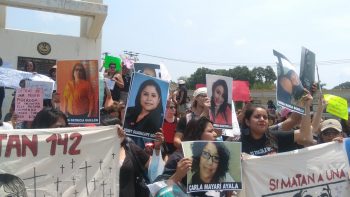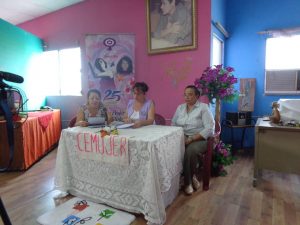 This past April 23rd, Miriam González, a 21 year old Salvadoran decided to break the cycle of violence in which she was suffering. However, when she tried to bring charges to a justice of the peace in El Salvador, she received no help, and two hours later, when she returned home, her partner slit her throat.
This past April 23rd, Miriam González, a 21 year old Salvadoran decided to break the cycle of violence in which she was suffering. However, when she tried to bring charges to a justice of the peace in El Salvador, she received no help, and two hours later, when she returned home, her partner slit her throat.
Gang violence is not the only violence which is claiming lives in El Salvador. Salvadoran women are being killed or beaten by their husbands until they die. The majority of these cases go unpunished.
“It is a distressing situation. The official statistics by themselves are one thing, but the data about the removal and processing of cadavers indicate to us that the numbers are even greater. There is stigmatization if the women are murdered in cases having to do with gangs or if they are poor women. When these cases are dealt with, they are not processed as feminicides,” Irma Guriola, director of CEMUJER, told the Program of the Americas.
The feminist struggle against severe antiabortion laws only addresses one problem. Now groups and activists for human rights hope that the authorities will respond immediately and effectively to the increase in feminicides which in the month of April alone claimed the lives of 34 women who were brutally murdered by their partners.
According to the official statistics of the National Civil Police (PNC in Spanish), between January and April of this year, 157 women were murdered in cases of domestic violence or sex crimes. Last year, during the same period, the figure was 124. According to studies by the United Nations, in El Salvador where around 21 muders a day occur, a woman dies ever ten hours in a sex crime
The director of the PNC, Howard Cotto, said that of all those reported to be victims of violent crimes in the country, 12% are women. Furthermore, it is also accepted that not all feminicides are reported as such. They may rather be processed as murders connected to crimes committed by gangsters against persons related to gangs.
45% of the women the pólice reported murdered in the country, are less than 25 years of age. In the majority of cases, the victims suffered multiple beatings and torture before being strangled, this without counting the unidentified bodies of women found in rural areas or hidden cemeteries.
“We roundly condemn the violence against girls, teen agers and women. Feminicide is its most extreme manifestation. It is imperative to eradicate it. It is imperative to attack the impunity, investigate the crimes, and render swift justice. At the same time, it is essential that society mobilize and show solidarity on behalf of girls, teenagers and women who suffer from this violence,”Christian Salazar Volkmann, resident coordinator of the UN in El Salvador said in a special communique.
Although the cases of feminicides in recent months have caused street protests by feminist groups and people against domestic and sex violence in the country, the Salvadoren governmnt´s response has been to provide very Little information about the strategy for the prevention of feminicides and violence which they´ve launched.
“We need to execute immediate measures which permit us not only to strengthen efforts to prevent this violence but also to denounce it and to protect affected women,” he said during a meeting of President Salvador Sánchez Ceré’s ministers.
Victims of macho violence
 They didn´t take Miriam´s denunciation in the Peace Court because she didn´t have all the data the office needed. “They ordered her back to the streets to look for it… she was sent out and two hours after coming to court, she was dead,¨said the Salvadoran attorney general regarding this case.
They didn´t take Miriam´s denunciation in the Peace Court because she didn´t have all the data the office needed. “They ordered her back to the streets to look for it… she was sent out and two hours after coming to court, she was dead,¨said the Salvadoran attorney general regarding this case.
The Salvadoran authorities identified Ángel Ernesto Videz Quijano as the murderer who slit MIriam´s throat. However, the man is a fugitive. “The statistics have always been alarming, but now we are seeing society waking up to the face of sex violence and feminicides. However, in our society there is an environment which accepts violence and impunity as natural. The message for the victims is that justice will not be done,”Carla was seen for the last time after the PNC Christmas fiesta,” said the director of CEMUJER.
Like Miriam, many Salvadorans never receive the support which the state is supposed to provide for its citizens because of domestic and sexual violence. Among the recent cases which have achieved notoriety in the country, is that of Carla Auala, a police agent who disappeared in December 2017.
Carla was seen for the last time after the PNC Christmas fiesta. One of her companions, who fled after that night, shot her inside a police patrol car. The Director of Police admitted recently that he had obstructed and covered up the investigations by the police and the institution heads who knew about it the very night it happened. Carla was wounded by a bullet in unexplained circumstances.
Some days later, the police woman Lorena Beatriz Hernández was also murdered by a policeman who was her partner. The man shot her with his police weapon while they were arguing inside the police delegation where they worked. At first, the authorities said that it was a suicide, but a little while later, Hernández´s companions said that it was her partner who shot her.
The 26th of January, Dr. Rosa Maria Bonilla was murdered by her husband. According to the police, the woman was beaten until she died. There were trails of blood all over her house. Her murderer, Denys Edenilson Suárez Mejía tried to clean the house after beating her, but he was captured and found himself accused of feminicide.
Another case which caused outrage in El Salvador was the murder of Graciela Eugenia Ramírez whose fiance stabbed her more than fifty times. The attorney general said that when the young woman was being murdered in her house, the neighbors called 911 to get help, but the police never arrived.
After the crime, José Héctor Otero, the woman´s partner, took the body with the help of his brother and left it in a rural area near their home. He was detained three months later when he returned from Guatemala.
The second week of April, in a case of macho violence, a labor union reporter was beaten up. The body of journalist Karla Turcios was found in a rural area of the country two hours from the capital after her partner reported on social media that she had disappeared. She was suffocated, her body had two plastic bags tied around her neck along with a woman’s undergarment.
The Attorney General’s report said that Karia was beaten before being suffocated. Her partner, Mario Huezo, was captured after the journalist´s funeral according to the attorney general. He had murdered Karla in the house where they lived and then taken the body to the area where it was found. All this happened in front of the pair’s five year old son.
Since the murder of Karla Turcios, Salvadoren women have been denouncing more cases on social networks. Some days after this crime, the sister of Katherine Cárcamo wrote on facebook that her sister´s partner, a violent man, had murdered her.
Katherine also had been beaten up and strangled in front of her daughter. Her body was found by her family days after her murder. The police detained Bryan Alexis Arévalo, her boyfriend, on the border between El Salvador and Guatemala as he was trying to excape.
Impunity and little support for women
Of the 34 murders of women which occured in April, Salvadoren authorities have only been able to solve four. In a recent investigation, Salvadoren journalist Jorge Beltrán Luna said that the Public Ministry had more interest in some cases of feminicide and sex violence because of the media attention they received.
Beltran Luna said that police investigatiors confirmed to him that “there was discrimination” in some investigations; since some cases are “handed over” by the authorities that direct the police or the attorney general owing to their presence in the media and social networks. The rest of the cases haven´t gotten much further than identification of the body.
“I believe that the government should demand that the Attorney General act with more strength and responsibility in all cases of sex violence, not only those in the media. There are a huge number of cases which are lost because of a lack of interest or follow-up by the police and the Attorney General. Furthermore, support of the victims is minimal. These women need supprt until the case is finalized” said the Salvadoran women’s rights activist Paola Renderos.
 Although the director of CEMUJER, Ima Guirola. recognizes that there have been advances in recent years in the approach to violence, support for victims and the response of the authorities still are not sufficient. It is not a culture which denounes this violence [as can be seen by] the answers its victims receive.
Although the director of CEMUJER, Ima Guirola. recognizes that there have been advances in recent years in the approach to violence, support for victims and the response of the authorities still are not sufficient. It is not a culture which denounes this violence [as can be seen by] the answers its victims receive.
“A this moment, there is a great deal of populism [popular support] addressing the theme of feminicide and sexual violence as we see in condemnations on social networks. But we need action and answers from the authorities. We are still leaving the responsibility to condemn the acts to the victims. It’s still up to the victims to go from one place to another to see if they can get help,” said Guirola.
Recently Fausto Carranza, the voice of the PNC, said at a press conference that the people have to cast light on these cases and furthermore, they have to involve themselves in the preventive work against domestic violence and sex crimes. Although some people use social networks to denounce them, it´s not sufficient to make the authorities act, since the pólice only receive 16 charges of violence a month in their offices.
It’s necessary to bring feminicide to the attention of the whole population. It is not only an expression of violence against women. Many girls are at risk. Because of this, state institutions must be prepared to efficiently and professionally help all women who suffer from missogynistc aggression,” added Howard Cotto, the director of the PNC.
In 2015 El Salvador approved the Special Law for a Life Free from Violence against Women, but it gave no responsibility to the state or its institutions in cases like those of Miriam and Graciela or in those cases for which the courts don´t receive the charges and the pólice don´t respond to emergency calls.
The immediate action which the Attorney General has taken is to demand that the authorities of the Ministry of Security consider sending the men detained and convicted of feminicides to a máximum security prison where prisoners include the heads of gangs, to send a message to aggressors.
“If they are so macho as to kill women, they have to be sufficiently macho to endure the restrictions of this kind of prison. I´ve asked the Ministry of Security that these men be sent to a maximum security prison. It is not possible that we are at this moment, with the onslaught of indiscriminate feminicides by men who are [also] committing all kinds of economic, physical, patrimonial and psychological violence,” said the Salvadoran attorney general.
However, the director of CEMUJER considers that because of the authorities´lack of political will to implement actual plans of protection, of victim support and support for children of victims; the lack of concrete actions to develop a culture of condemnation by the populace; the unresolved cases, the institutions of justice of the Salvadoran state have lost credibility.
A number of Salvadoran feminist organization have published a communique in which they said that the impunity in the country has become a vehicle for the normalization of behaviors of hate and violence against women showing the complicity of a state that does not succeed in protecting the exercise of rights by its citizens.
Translated by Esther Buddenhagen



